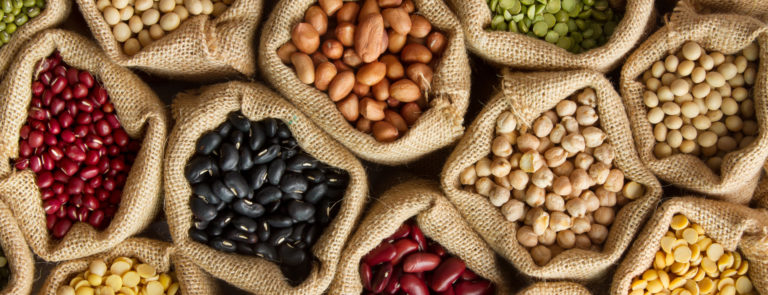10% off £35
Code:SAVE
Your fibre FAQs answered

Fibre is one of the essential components of a healthy diet. But what is fibre? What does fibre do? Why is fibre important and what are the best high-fibre foods? Read on to find out.
What is fibre?
Put simply, fibre – also known as ‘roughage’ – is a complex carbohydrate, derived from plants, which the body cannot digest.
Enzymes are constantly working to break down the food you eat. These enzymes are released by your digestive system (mainly by your pancreas and small intestine) and convert carbohydrates, proteins and fats into nutrients which are then absorbed into your body to support its healthy function.
Fibre, however, is not broken down by digestive enzymes in the way that carbs, proteins and fats are. Fibre’s role in a healthy diet is to make the digestive process itself smooth and effective.
Broadly, there are two types of fibre- soluble and insoluble.
- Soluble fibre (e.g. oats and fruit) dissolves in the liquids in your digestive system.
- Insoluble fibre (such as bran or nuts) does not dissolve in your digestive system and can pass through via your stool relatively intact (think sweetcorn).
What does fibre do?
Soluble fibre attracts water as it moves through the small intestine, creating create a gel-like substance as it passes through into your large intestine. This softens your stool and adds bulk as well as binding with unwanted particles (e.g. cholesterol or sugar) to aid their elimination from the body. According to recent research, a type of soluble fibre called resistant starch ferments in the large intestine, feeding the gut with ‘good’ bacteria in the same way as a prebiotic and producing short-chain fatty acids which are beneficial to health.
Insoluble fibre adds further bulk and gives form to your stool, binding indigestible waste products together and encouraging your stool to move more swiftly and completely through the large intestine. This type of fibre is what people usually think of as ‘roughage’.
What are the benefits of fibre?
- Better bowel movements - With the right hydration, an adequate intake of insoluble fibre encourages regular (and satisfying) bowel movements. Regular bowel movements are important for ridding your body of waste products including undigested food and unwanted bacteria. It is important to note that ‘regular’ is different for everyone – for you that may mean twice daily or just a couple of times a week. The general rule is, if it is normal for you and you’re not bloated or in any discomfort, then your bowel movements are ‘regular’.
- Balanced blood sugar - Soluble fibre might help lower blood glucose levels, making it a great choice for diabetics. Soluble fibre slows down the digestive process, which slows the rate at which carbohydrates and sugars are absorbed into the bloodstream, minimising spikes in blood sugar.
- Reduced cholesterol - Soluble fibre has also been shown to reduce levels of ‘bad’ cholesterol and a reduced risk of cardiovascular disease including heart attacks and stroke. Beta-glucans (a form of soluble fibre found in high levels in oats) binds with cholesterol in the small intestine, preventing it from being absorbed by your body so cholesterol is eliminated along with your stool.
- Protection from bowel cancer - Studies in recent years have linked a high intake of dietary fibre, particularly from cereal and wholegrains, with a reduced risk of bowel cancer. This is because fibre helps eliminate toxins (for instance from processed red meat) from the body more rapidly.
- Weight loss - A fibre-rich diet can help you maintain a healthy weight. Finally, anyone who has ever enjoyed a bowl of brown rice will know, fibre promotes satiety – that feeling of fullness that stops you reaching for snacks after meals.
How much fibre do I need per day?
According to UK government guidelines, adults should be getting 30g fibre a day. Around 9 in 10 people in the UK are not meeting this with most adults eating an average of 18g a day.
What happens when I don’t get enough fibre?
Insufficient fibre intake can cause constipation, bloating and loose stools, along with a general feeling of sluggishness. The undigested food, waste products and bacteria hang around in your gut for longer without being eliminated, which can cause inflammation. Additionally, a diet lacking fibre can lead to weight gain, as without fibre to make us feel full, we are at risk of overeating.
Can I have too much fibre?
Despite most people not getting enough, it is possible to eat too much fibre. Warning signs include constipation, feeling ‘blocked up’ and bloated, gas and stomach cramps. If you switch from a low-fibre diet to a high-fibre diet too quickly, you could experience digestive discomfort- so it is always best to increase high-fibre foods gradually until you reach the recommended 30g fibre daily.
Where can I get fibre?
Fibre is easily and abundantly found in a range of delicious and nutritious foods. So, what foods contain fibre? The best fibre foods are often convenient and cheap, e.g. fruits, vegetables, whole grains and legumes. There is 4.4g fibre in a medium apple and 3.1g fibre in a banana. Other foods that are high in soluble fibre include oats, peas, beans, citrus fruits, carrots, barley and nuts. Insoluble fibre can be found in wheat bran, brown rice, cauliflower, potatoes, tomatoes, cucumbers, carrots and nuts. Sources of resistant starch include green bananas, white beans and lentils.
Last updated: 17 March 2020
- https://www.nhs.uk/live-well/eat-well/how-to-get-more-fibre-into-your-diet/
- https://www.cancerresearchuk.org/about-cancer/causes-of-cancer/diet-and-cancer
- https://www.diabetes.co.uk/nutrition/soluble-fibre.html
- https://www.ncbi.nlm.nih.gov/pmc/articles/PMC4220782/
- https://www.bmj.com/content/343/bmj.d6617
Related Articles
Shop by wellness goal
Sign up for exclusive offers
Plus, get expert advice to support your health & wellness straight to your inbox when you sign up to Holland & Barrett emails.
Read our
privacy policy














